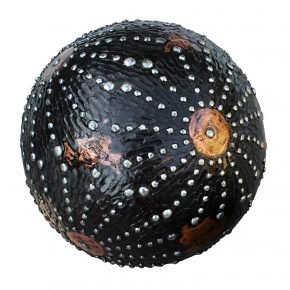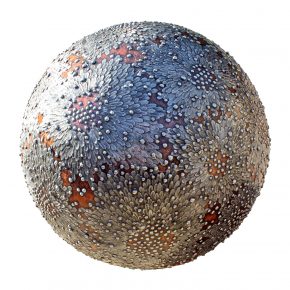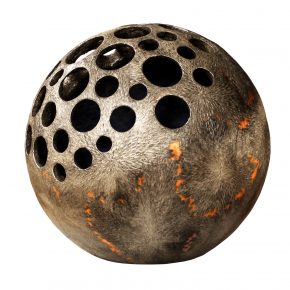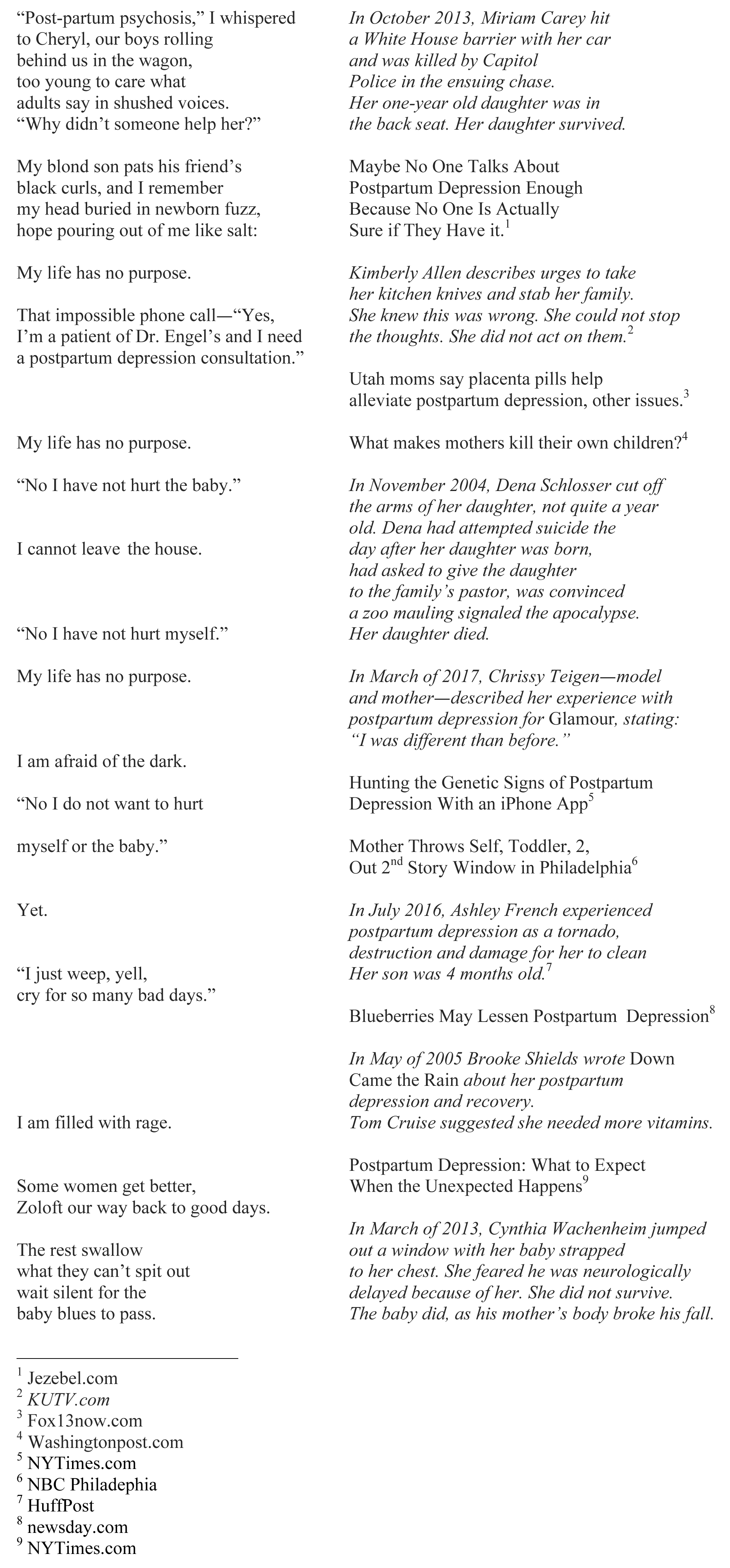Criticism / Michelle Sizemore
:: Do the Math and Delight ::
Why are we talking math in a journal of poetry and prose? This question captures a tested and reliable division between the arts/humanities and quantitative fields both in academics and the wider culture. While there is certainly no consensus on whether mathematics is a science, it is frequently grouped with sciences and other fields that rely on it. Witness the STEM vs. STEAM debates in K‑12 education. Advocates for STEM (a curriculum integrating Science, Technology, Engineering, and Mathematics) argue that study of the arts will dilute the STEM focus. Meanwhile, advocates for STEAM (a curriculum adding the Arts to STEM, an extravagant “A” wedged into this short acronym auguring sensible career choices) argue that the arts enhance the sciences. [i] Similar debates roil post-secondary education. And administrators and faculty aren’t the only ones weighing in on the value of liberal education vs. STEM or professional education. Case in point: the acrimonious Twitter feud between STEM majors and Humanities, Social Science, and Education majors last December. [ii]
The hedges go up more quickly outside the compass of curriculum and instruction. Chitchat over the years in every conceivable setting has yielded a pattern in which acquaintances, after learning what I do for a living, either confess to being bad at English but good at math or declare, in solidarity, that writing comes easily while numbers are stumpers. These divisions seem overblown. Most people write every day, composing texts, emails, Facebook posts, tweets, snaps. Most people also go to the store without hauling in an abacus.
This collection of examples points to the habitual partitioning of language and math, even though these two “adversaries” hold undeniable affinities. Poets and mathematicians alike have long recognized the reciprocity between the disciplines. Emily Dickinson, for one, lavished her poetry with math. Approximately 200 of her poems make reference to mathematical terms and concepts, demonstrating compatibility between mathematical principles and lyrical sensibility. As Seo-Young Jennie Chu writes, “Not only did [Dickinson] have a poetic understanding of mathematics, but she had a deeply mathematical understanding of her own poetic enterprise.” [iii] Albert Einstein used poetry as a metaphor to express the beauty of mathematical endeavor, characterizing “pure mathematics” as “the poetry of logical ideas.” [iv]
It is not uncommon for mathematicians to locate a kinship between mathematics and literature in their shared aesthetic properties. For some, “aesthetics” names classic aesthetic qualities of art such as beauty, elegance, symmetry, and balance. Masahiko Fujiwara observes:
It is impossible to put in words the intrinsic grace of a theorem… I can only describe it as being akin to a perfect piece of music in which each note is irreplaceable or to a haiku in which no syllable can be changed. The beauty I speak of is like the exquisite tension that holds together aspects of a work of art; a fragile serenity that cements its perfection. And so the magnetic force that draws art—and therefore literature—to mathematics is the dignified beauty of its pure logic. [v]
Like so many in his discipline, Fujiwara joins theorems and proofs with works of art such as literature because of the “grace” and “beauty” of their composition. Other mathematicians emphasize the aesthetic experience of solving a problem, the pleasure taken in arriving at meaning, of “coming-to-understanding,” in the words of David W. Henderson and Daina Taimina. [vi] Multiple meanings of “aesthetics” also circulate are also in circulation in art criticism and literary studies, where the common wisdom is to “encourage a variety of investigations under its aegis” rather than “to prescribe a single definition.” [vii] Mathematical aesthetics can therefore denote the beauty of the work, the sensuous experience of performing the work, and more. This latter sense, the feelings evoked by the doing, is especially compelling to me.
Of course mathematicians and artists don’t have a corner on the aesthetic experience of “coming-to-understanding.” The pleasure of solving a problem belongs to every reader of mysteries and every fan of cryptography adventure movies. If you’re having trouble placing this genre, think National Treasure. The 2004 film stars Nicolas Cage as Benjamin Franklin Gates, a historian-cryptanalyst who has devoted his life to the discovery of a rumored national treasure hidden by the U.S. Founding Fathers. Gates follows a trail of obscure clues: one etched inside the stem of a meerschaum pipe concealed in a gunpowder barrel in a sunken ship at the bottom of the Arctic Ocean, another written on the back of the Declaration of Independence in invisible ink, and so on. Predictably, each puzzle and solution leads him closer to the treasure (buried all along in a secret grotto several stories beneath Boston’s Old North Church). Critics and movie-goers who panned the film cited its overblown and improbable plot. Because Hollywood films are usually subtle. [viii]
But I enjoyed the preposterousness of the treasure hunt. I enjoyed watching Gates and his team solve clues requiring dexterity with words and numbers. The code concealed on the back of the Declaration is an Ottendorf or book cipher, which uses a book or another written text to encode and decode a message recorded in numbers. To decode the message, Gates and crew have to match the Declaration’s “magic numbers,” as one character calls them, to corresponding words in a key, in this case The Silence Dogood Letters. The number clusters found on the Declaration (10–11‑8, 10–4‑7, 9–2‑2, 14–8‑2, etc.) refer to the page number of The Silence Dogood Letters, the line on the page, and the letter in the line, respectively. [ix] As a scholar of early America, I was thrilled to encounter these eighteenth-century texts on the big screen, along with landmarks and arcana from the founding era: Independence Hall, the Liberty Bell, Paul Revere, freemasonry, George Washington’s election campaign buttons. Historical padding? Yes. But any annoyance at drive-through history was offset by the satisfaction of being in on the esoterism.
In a film relentless with its inclusion of American Independence references, it’s no surprise Benjamin Franklin gets folded in. But Franklin is more than a passing mention; his presence hangs over the entire film. Franklin is the protagonist’s namesake, he’s the author of The Silence Dogood Letters, he invents the bifocals they use to view the 3‑D treasure map on the Declaration. A Franklin impersonator makes an appearance at the Franklin Museum in Philadelphia, and in a deleted scene they must decipher Franklin’s “Join or Die” political cartoon to escape death. Perhaps the screenwriters were paying homage to Franklin’s ingenuity in a movie that revels in the cleverness and resourcefulness of its problem-solving hero. Or perhaps, more directly, they were alluding to Franklin’s real-life preoccupation with cryptography. He developed numerical codes for secret messages during the Revolutionary War and for American diplomatic correspondence afterward. [x] Re-watching the movie reminded me that the polymathic Franklin is a quintessential example of someone who not only delighted in puzzle-making and problem-solving but also joined numbers and letters in his pursuits.
Nevertheless, Franklin has a reputation for being bad at math. Much of this owes to Franklin’s own description of his “ignorance of figures.” [xi] Early in the Autobiography of Benjamin Franklin he recounts how at age nine his father sent him to George Brownell’s school, where he “acquired fair writing pretty soon but… failed in… arithmetic and made no progress in it.” [xii] Scholars from literary studies to computer science have generally taken him at his word, no doubt due to the enduring conceptual opposition between writing and math. Despite his notoriety as math-deficient, Franklin was actually gifted. He used population statistics in his “Observations Concerning the Increase of Mankind, Peopling of Countries, Etc.” (1751) and employed geometry in his invention of the glass armonica (a musical instrument consisting of spinning glass discs). The list of Franklin’s mathematical investigations goes on—utility theory, accounting, applied mathematics, navigation, daylight saving time. [xiii]
To fully appreciate these developments, we have to look past his part in the national origin story. He wasn’t only a key player in the United States’ founding, but also a leading scientist in a transatlantic community of scholars. [xiv] From the late 1740s through the late 1760s, Franklin’s study of electricity developed within a network of communication with and support from a confrere of Atlantic scientists, culminating in Experiments and Observations on Electricity (a series of letters to English friend and patron Peter Collinson, originally published in 1751 and undergoing subsequent editions through 1769). In 1756, Franklin’s research on electricity and invention of the lightning rod earned him the distinction of fellow at the Royal Society of London, Britain’s foremost scientific organization. Franklin’s Experiments and Observations on Electricity was a towering achievement of Enlightenment-era science—but it was not, as we might expect of a scientific work in the Age of Reason, strictly committed to the advance of reason. [xv] For one, “magical” math puzzles crop up in the volume.
Occupying Franklin’s thinking for nearly half a century were numerical puzzles known as It may be tempting to trivialize such pursuits as many of his biographers have—Sudoku for the eighteenth century, Candy Crush for the insufferable meeting. We know, for instance, that Franklin doodled with these games to “amuse [himself]” during the speeches at the Pennsylvania Assembly. [xvi] He would have gained access to these puzzles through the transatlantic circulation of texts such as Jacques Ozanam’s Recreations Mathematical and Physical and John Tipper’s The Ladies’ Diary, or, the Woman’s Almanack. First published in France in the 1690s and then revised by a variety of editors over the next 150 years, Ozanam’s Recreations would remain the most important reference on recreational mathematics for over two centuries. Tipper’s The Ladies’ Diary was a popular British almanac that ran from 1704 through 1752 and combined conventional almanac subjects with riddles and mathematical puzzles. Franklin routinely solved these premade magical squares and circles and also invented his own. [xvii]
Magic squares and magic circles are like crosswords—except with numbers. You fill in the spaces with numbers instead of letters. The goal with a magic square is to make each line of numbers across, down, or diagonally total the same value. [xviii] Puzzles like these had preoccupied thinkers for centuries before Franklin made his contributions. Historians trace them to philosophers and theologians in China as early as the fourth century BCE, then to Mesopotamia, and then across most of the known world by the end of the first millennium. These numerical arrangements were believed to possess supernatural properties and figured meaningfully in Chinese, Middle Eastern, and Western occultism. They were incorporated into incantations and spells, emblazoned on amulets, talismans, and plates, and administered in divination and cosmological representation.
In ancient China, for instance, these 3x3 squares, called the 9–5‑1, 4–9‑2, and so on. People regarded these matrices as supernatural because they represented the universe in microcosm: nine squares conveyed the Nine Divisions of Heaven, the Nine Continents, the Nine Territories, the Nine Divisions of the Middle Kingdom. The Lo Shu, moreover, was a profound expression of equilibrium The eight even and odd numbers representing yin and yang are held in balance around the axial center (the number 5). Thus the Lo Shu square could effectively symbolize the world in balanced harmony around a powerful central axis. [xix]
Magic squares embody the aesthetic qualities of balance and symmetry, and beauty when one beholds their geometrical patterns and forms. Certainly Franklin was drawn to both the aesthetic qualities of magic squares and the aesthetic experience of solving them. But why are such puzzles tucked in among Franklin’s writings on electricity?
Before the famous encounter between lightning, kite, and key in 1752, Franklin began his electrical experiments more modestly with glass tubes in 1746, offering an initial theory classifying electricity as a fluid. The technical details of this experiment aren’t as important here as the concepts of “plus” and “minus.” According to this theory, the glass tube began in a “positive” state or a “plus” condition, and rubbing the glass removed part of the electricity from it, leaving it “minus” some of its electrical fluid or in a “negative” state. Franklin would eventually refine his theory of electricity, likening it to a fire rather than a fluid and adjusting some other essential points, but retaining the electrical vocabulary of plus/minus, positive/negative, and equilibrium that he invented—and is still used today. [xx]
Now we may be getting closer to an explanation of why a discussion of magical squares turns up in a volume on electricity. On some level, the numerology of the square—its demonstration of absolute equality and perfect balance—resonated with Franklin’s electrical conception of equilibrium and the even and odd numbers carrying symbolic connotations of positive and negative. While he may not have exactly had in mind yin and yang, he did hint at the mystery of cosmic balance in the physical world when speaking of magic squares and electrical phenomena, describing both as “miraculous.” [xxi] “Coming-to-understanding,” for Franklin and contemporaries who studied electricity, meant advancing a rational explanation of electricity’s behavior while maintaining an appreciation of electricity’s mystery—its “wonderful” and “amazing” power—and by extension the power of nature. [xxii]
Thus, in part, the pleasure Franklin took in electrical and mathematical problem-solving derived from contemplative wonder in the inexplicable workings of nature. In Experiments and Observations on Electricity, he describes his innovations with the 16x16 magical square as the “most magically magical of any magic square ever made by any magician.” [xxiii] Franklin’s marveling at the de trop “magically magical” character of his square reveals an important distinction between the eighteenth-century scientific world’s understanding of magic and that of the pre-Scientific Revolution. Rather than an attribution of supernatural properties to the square, Franklin’s remark is an assertion of admiration and delight, “magic” denoting “an inexplicable and remarkable influence producing surprising results” or “an enchanting or mystical quality” (OED). [xxiv] His wonder at nature’s mysteries isn’t reverential but playful, a fitting tone for pursuits regarded as entertainment.
In the correspondence between Franklin and other Royal Society members, researchers often modulate descriptions of their intellectual curiosity by characterizing their activities as a pastime or a diversion. Franklin’s letters to Collinson repeatedly offer his recital of electrical experiments and magical squares for the purpose of Collinson’s “amusement.” [xxv] This emphasis on learned entertainment among members of the Royal Society and other intellectual circles signals the emerging practice of academic sociability in the latter half of the eighteenth century. [xxvi] After all, Franklin conveys his findings on electricity in a letter exchange with a colleague and friend rather than in a formal dissertation. Far from dividing language and numbers, then, the scientific community developed literary conventions and genres for the delight in figures.
While educated laypersons did read science writing like Experiments and Observations, more often they gratified their mathematical curiosity with problems in almanacs and puzzle and game books. These brain-teasers belong to a larger category of eighteenth-century entertainment including riddles and games, which encouraged new patterns of thought and elicited surprise, wonder, and delight through problem-solving. [xxvii] It’s intriguing to think about an earlier generation that openly acknowledged the pleasure as well as the pragmatic value of math—that developed a relationship to math defined by recreation rather than compulsion, by creativity, ingenuity, and enjoyment rather than tedium and panic. I’m not sure we’ve gotten to the point where large numbers of people conceive of math as fun, but maybe we’re making our way there. Most national and local newspapers contain “Games and Puzzles” sections that increasingly feature much more than the crossword. The relaunch of the New York Times Magazine includes math puzzles and games like , Sudoku, and SET alongside its famed Sunday crossword. Hundreds of new apps make math enjoyable and readily accessible for children and adults looking to sharpen their skills or simply to pass the time. The land of games and puzzles may be the renewed meeting ground for words and numbers. What possibilities lie ahead with greater nimbleness in both language and math? What cross-pollinations might occur from this “bilingualism”? We must do the words, and do the math.
[i] As STEAM’s supplementary appeal for the arts implies, the goal isn’t to integrate the arts and sciences—to achieve mutual influence—but rather to serve the STEM fields. I’m not interested in taking sides in this debate here, rather in pointing out the fundamental separation and hierarchy between the arts and sciences even in efforts to join them.
[ii] @jaboukie, “i WISH i could just read clifford the big red dog and make flower crowns,” Twitter (5 December 2018, 1:53 p.m.).
[iii] Seo-Young Jennie Chu, “Dickinson and Mathematics,” The Emily Dickinson Journal 15.1 (2006), 36.
[iv] Albert Einstein, “The Late Emmy Noether: Professor Einstein Writes in Appreciation of a Fellow-Mathematician,” The New York Times (4 May 1935), 12. Print.
[v] Masahiko Fujiwara, “Literature and Mathematics,” Asymptote (January 2011).
[vi] David W. Henderson and Daina Taimina, “Experiencing Meanings in Geometry,” Mathematics and the Aesthetic: New Approaches to an Ancient Infinity, Ed. Nathalie Sinclair et al. (Springer, 2007), 83.
[vii] Cindy Weinstein and Christopher Looby, “Introduction,” American Literature’s Aesthetic Dimensions (Columbia Univ. Press, 2012), 4.
[viii] See Roger Ebert, “National Treasure,” Roger Ebert.com (18 November 2004); Stephen Holden, “A Secret Treasure Map That Ends in Manhattan,” New York Times (19 November 2004); Carina Chocano, “Bankrupt National Treasure,” L.A. Times (19 November 2004); “National Treasure (2004),” Rotten Tomatoes (Accessed 19 May 2018).
[ix] Simon Singh, The Code Book: The Science of Secrecy from Ancient Egypt to Quantum Cryptography (Anchor, 2000).
[x] Ralph E. Weber, United States Diplomatic Codes and Ciphers, 1775–1938 (Precdent Publishing Inc., 1979); David Kahn, The Codebreakers: The Story of Secret Writing (Scribner, 1996), 185.
[xi] Benjamin Franklin, Autobiography of Benjamin Franklin. 1791 ed. (Walter J. Black, Inc., 1941), 24.
[xii] Franklin, Autobiography, 13.
[xiii] Paul C. Pasles, Benjamin Franklin’s Numbers: An Unsung Mathematical Odyssey (Princeton Univ. Press, 2008), 5–11.
[xiv] Bernard Cohen, Benjamin Franklin’s Science (Harvard Univ. Press, 1990); Park Benjamin, A History of Electricity: From Antiquity to the Days of Benjamin Franklin (John Wiley & Sons, 1898).
[xv] James Delbourgo, A Most Amazing Scene of Wonders: Electricity and Enlightenment in Early America (Harvard Univ. Press, 2006), 8.
[xvi] Franklin, Autobiography, 189.
[xvii] Pasles, 117–137.
[xviii] The object of this “cross-number” puzzle is to fill in the boxes so that each of the rows across, up and down, and diagonally equal the same sum. The best way to begin is to figure out the total of all 9 boxes, which must be filled in with the numbers 1–9. 1+2+3+4+5+6+7+8+9=45. Since we know each row must equal the same value, and since there are three equal rows, we can divide by 3 to determine the sum of each row: 15. From there, fill in the numbers on the grid until each row equals 15 in every direction. I’m indebted to Paul C. Pasles’s Benjamin Franklin’s Numbers for its lucid explanation of these puzzles.
[xix] Pasles, 20–27; Schuyler Cammann, “The Magic Square of Three in Old Chinese Philosophy and Religion,” History of Religions 1.1 (1961), 37–80.
[xx] Cohen, 14–39.
[xxi] Benjamin Franklin, Experiments and Observations in Electricity, 4th ed. (David Henry, 1769), 14.
[xxii] Franklin, Experiments, 3, 35, 375, 485; Delbourgo, 11.
[xxiii] Franklin, Experiments, 353.
[xxiv] “magic, n.” OED Online, (Oxford University Press, March 2018).
[xxv] Franklin, Experiments, 177, 237, 354.
[xxvi] Susan Scott Parrish, American Curiosity: Cultures of Natural History in the colonial British Atlantic World (Univ. of North Carolina Press, 2006).
[xxvii] See Jillian Heydt-Stevenson, “Games, Riddles, and Charades,” The Cambridge Companion to Emma, Ed. Peter Sabor (Cambridge Univ. Press, 2015), 150–165; Mary Chadwick, “‘The Most Dangerous Talent’: Riddles as Feminine Pastime,” Women, Popular Culture, and the Eighteenth Century, Ed. Tiffany Potter (Univ. of Toronto Press, 2012), 185–201.
Bibliography
Benjamin, Park. A History of Electricity: From Antiquity to the Days of Benjamin Franklin. New York: John Wiley & Sons, 1898.
Cammann, Schuyler. “The Magic Square of Three in Old Chinese Philosophy and Religion,” History of Religions 1.1 (1961).
Chadwick, Mary. “‘The Most Dangerous Talent’: Riddles as Feminine Pastime,” Women, Popular Culture, and the Eighteenth Century, Ed. Tiffany Potter. Toronto: Univ. of Toronto Press, 2012.
Cohen, Bernard. Benjamin Franklin’s Science. Cambridge: Harvard Univ. Press, 1990.
Chu, Seo-Young Jennie. “Dickinson and Mathematics,” The Emily Dickinson Journal 15.1 (2006), 35–55.
Delbourgo, James. A Most Amazing Scene of Wonders: Electricity and Enlightenment in Early America. Cambridge: Harvard Univ. Press, 2006.
Einstein, Albert. “The Late Emmy Noether: Professor Einstein Writes in Appreciation of a Fellow-Mathematician,” The New York Times (4 May 1935), 12. Print.
Franklin, Benjamin. Autobiography of Benjamin Franklin. 1791 ed. New York: Walter J. Black, Inc., 1941.
Franklin, Benjamin. Experiments and Observations in Electricity, 4th ed. London: David Henry, 1769. Google Books. Accessed May 20, 2018. https://books.google.com/books/about/Experiments_And_Observations_On_Electric.html?id=-48_AAAAcAAJ
Fujiwara, Masahiko. “Literature and Mathematics,” Asymptote (January 2011). Accessed May 20, 2018. https://www.asymptotejournal.com/nonfiction/masahiko-fujiwara-literature-and-mathematics/
Henderson, David W. and Daina Taimina. “Experiencing Meanings in Geometry,” Mathematics and the Aesthetic: New Approaches to an Ancient Infinity, Ed. Nathalie Sinclair et al. New York: Springer, 2007.
Heydt-Stevenson, Jillian. “Games, Riddles, and Charades,” The Cambridge Companion to Emma, Ed. Peter Sabor. Cambridge: Cambridge Univ. Press, 2015, 150–165.
Kahn, David. The Codebreakers: The Story of Secret Writing. New York: Scribner, 1996.
Parrish, Susan Scott. American Curiosity: Cultures of Natural History in the colonial British Atlantic World. Chapel Hill, Univ. of North Carolina Press, 2006.
Pasles, Paul C. Benjamin Franklin’s Numbers: An Unsung Mathematical Odyssey. Princeton: Princeton Univ. Press, 2008.
Singh, Simon. The Code Book: The Science of Secrecy from Ancient Egypt to Quantum Cryptography. New York: Anchor, 2000.
Weber, Ralph E. United States Diplomatic Codes and Ciphers, 1775–1938. Fisher, IN: Precedent Publishing Inc., 1979.
Weinstein, Cindy and Christopher Looby, “Introduction,” American Literature’s Aesthetic Dimensions. New York: Columbia Univ. Press, 2012.
Michelle Sizemore is Associate Professor of English at the University of Kentucky. She is the author of American Enchantment: Rituals of the People in the Post-Revolutionary World (Oxford, 2017) and has published articles and reviews in Legacy, Studies in American Fiction, American Literary History, Early American Literature, and other venues.




